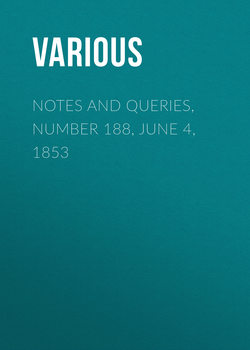Notes and Queries, Number 188, June 4, 1853

Реклама. ООО «ЛитРес», ИНН: 7719571260.
Оглавление
Various. Notes and Queries, Number 188, June 4, 1853
Notes
CORRECTIONS ADOPTED BY POPE FROM THE DUNCES
NOTES ON SEVERAL MISUNDERSTOOD WORDS
DEVONIANISMS
THE POEMS OF ROWLEY
FOLK LORE
SHAKSPEARE CORRESPONDENCE
Minor Notes
Queries
SMITH, YOUNG, AND SCRYMGEOUR MSS
MORMON PUBLICATIONS
MINOR QUERIES
Minor Queries with Answers
Replies
"PYLADES AND CORRINA."—PSALMANAZAR AND DEFOE
ROBERT WAUCHOPE, ARCHBISHOP OF ARMAGH
SEAL OF WILLIAM D'ALBINI
"WILL" AND "SHALL."
INSCRIPTIONS IN BOOKS
BACON'S "ADVANCEMENT OF LEARNING."
PHOTOGRAPHIC CORRESPONDENCE
Replies to Minor Queries
Miscellaneous
NOTES ON BOOKS, ETC
BOOKS AND ODD VOLUMES WANTED TO PURCHASE
Notices to Correspondents
CLERICAL, MEDICAL, AND GENERAL LIFE ASSURANCE SOCIETY
GILBERT J. FRENCH,
Отрывок из книги
In Pope's "Letter to the Honourable James Craggs," dated June 15, 1711, after making some observations on Dennis's remarks on the Essay on Criticism, he says—
An interesting paper might be drawn up from the instances, for they are rather numerous, in which Pope followed out this very sensible rule. I do not remember seeing the following one noted. One of the heroes of the Dunciad, Thomas Cooke, the translator of Hesiod, was the editor of a periodical published in monthly numbers, in 8vo., of which nine only appeared, under the title of The Comedian, or Philosophical Inquirer, the first number being for April, and the last for December, 1732. It contains some curious matter, and amongst other papers is, in No. 2., "A Letter in Prose to Mr. Alexander Pope, occasioned by his Epistle in Verse to the Earl of Burlington." It is very abusive, and was most probably written either by Cooke or Theobald. After quoting the following lines as they then stood:
.....
Thence kindly expanded into its wider meaning of general benevolence. So under another phase of its primary sense we find the epithet used to express the excellence and characteristic qualities proper to the idea or standard of its subject, to wit, genuine, thrifty, well-liking, appropriate, not abortive, monstrous, prodigious, discordant. In the Litany, "the kindly fruits of the earth" is, in the Latin versions "genuinus," and by Mr. Boyer rightly translated "les fruits de la terre chaqu'un selon son espèce;" for which Pegge takes him to task, and interprets kindly "fair and good," through mistake or preference adopting the acquired and popular, in lieu of the radical and elementary meaning of the word. (Anonymiana, pp. 380—1. Century viii. No. lxxxi.) The conjunction of this adjective with gird in a passage of King Henry VI. has sorely gravelled Mr. Collier: twice over he essays, with equal success, to expound its purport. First, loc. cit., he finds fault with gird as being employed in rather an unusual manner; or, if taken in its common meaning of taunt or reproof, then that kindly is said ironically; because there seems to be a contradiction in terms. (Monck Mason's rank distortion of the words, there cited, I will not pain the reader's sight with.) Mr. Collier's note concludes with a supposition that gird may possibly be a misprint. This is the misery! Men will sooner suspect the text than their own understanding or researches. In Act I. Sc. 1. of Coriolanus, dissatisfied with his previous note, Mr. Collier tries again, and thinks a kindly gird may mean a gentle reproof. That the reader may be able to judge what it does mean, it will be necessary to quote the king's gird, who thus administers a kindly rebuke to the malicious preacher against the sin of malice, i.e. chastens him with his own rod:
A gird, akin to, in keeping with, fitting, proper to the cardinal's calling; an evangelical gird for an evangelical man: what more kindly? Kindly, connatural, homogeneous. But now for a bushel of examples, some of which will surely avail to insense the reader in the purport of this epithet, if my explanation does not:
.....